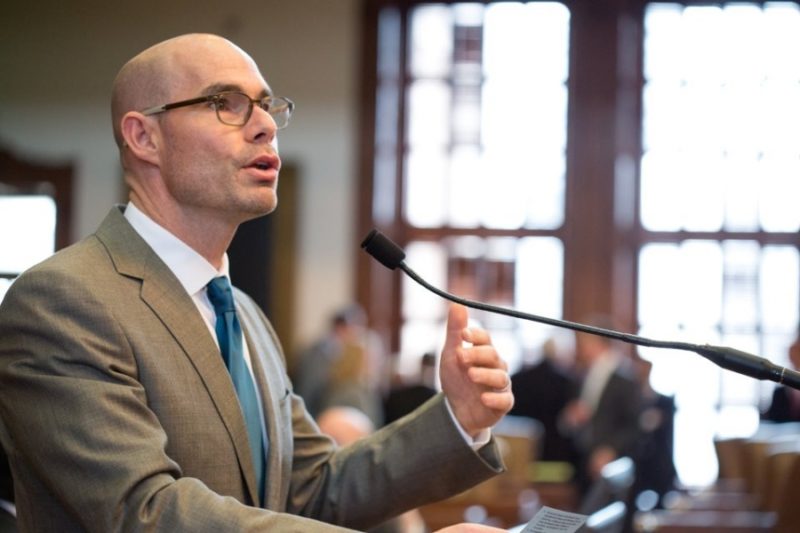A panel of three legal experts working for the Texas House General Investigating Committee concluded that Speaker Dennis Bonnen ‘likely’ violated a civil statute for which there is no set penalty when he offered media floor credentials to a conservative political operative who is barred under House Rules from having press credentials.
They also said “one could argue that Speaker Bonnen could be prosecuted” under the Penal Code‘s bribery statute, but didn’t think the statute was clear enough to warrant prosecution.
In a 15-page report, the lawyers looked into the facts surrounding a June 2019 meeting between Bonnen, Rep. Dustin Burrows, and Michael Quinn Sullivan, the head of Empower Texans, a group denied media credentials by the House because its affiliated political action committee is actively engaged in paid advertising, publicity, and other political activity involving the Texas House.
The meeting was investigated by the Texas Rangers‘ Public Integrity Unit at the request of the House Ethics Committee. Relying on the Rangers’ report as well their own legal analysis, the three-member legal panel concluded, “In our opinion, the information produced for the Public Integrity Unit Report militates against criminal prosecution of either Speaker Bonnen or Representative Burrows.”
This conclusion is similar to the one reached by District Attorney Jeri Yenne, who announced in October, “I do not believe there is sufficient evidence from the June 12, 2019 meeting to warrant a criminal prosecution of Speaker Bonnen for Bribery or Solicitation of a Gift by a Public Servant, therefore no criminal charges will be brought.”
Analysis of the Penal Code
In the first part of the report, lawyers looked into whether Speaker Bonnen had violated either the bribery statute (Penal Code sec. 36.02) or the prohibited gift statute (Penal Code sec. 36.08) by asking Sullivan to donate to his political opponents in return for media access.
They concluded, “one could argue that Speaker Bonnen could be prosecuted for soliciting a benefit for himself (by improving his likelihood of being re-elected Speaker or reducing his upcoming campaign expenditures) or for his Republican allies, in whose interest he might have a ‘direct and substantial interest.’ However, given both the lack of guiding case law and dissimilarity between Speaker Bonnen’s actions and the common perception of bribery prosecutorial discretion as this panel understands it would likely militate against bringing such a prosecution… In short, the scope of the key elements of the statute are not sufficiently clear, and the case authorities are too few, to conclude with any degree of confidence that prosecution against either Speaker Bonnen or Representative Burrows would be warranted under the Bribery Statute or Gift Statute.”
Analysis of the Election Code and Government Code
The report says Bonnen did not violate the Election Code. However, it does say that Bonnen likely violated a broadly worded ethics provision contained in Chapter 572 of the Government Code, which deals with officials’ standards of conduct and conflicts of interest.
The statute in question, sec. 572.051(a), prohibits a state officer from:
- “accept[ing] or solicit[ing] any gift, favor, or service that might reasonably tend to influence the officer or employee in the discharge of official duties or that the officer or employee knows or should know is being offered with the intent to influence the officer’s or employee’s official conduct;”
- “intentionally or knowingly solicit[ing]… any benefit for having exercised the officer’s… official powers or performed the officer’s official duties in favor of another.”
The Ethics Committee’s lawyers concluded, “Speaker Bonnen’s conduct likely violated section 572.051(a) of the Government Code, however, subsection (b) of this section provides no independent statutory consequences for an official who violates subsection (a).”
As described in the code, the penalty that may be imposed for a violation of this section is either termination or “another employment related sanction.” Sec. 572.051(b) says, “A state employee who violates Subsection (a)… is subject to termination of the employee’s state employment or another employment-related sanction.”
Bonnen has stated that he will not seek reelection in 2020, though he continues to serve as House Speaker in the interim until the next legislative session.
In a meeting Dec. 20, the House Ethics Committee adopted the lawyers’ report as their final report concerning the Bonnen-Sullivan meeting and submitted a copy to every member of the Texas House. They voted unanimously not to take further action on the matter.
Bonnen’s spokesperson Cait Meisenheimer stated, “The committee has confirmed what we have known for months and the conclusion of their report speaks for itself.”
The full report is available here. It was written by three lawyers: former University of Houston law professor and Texas House member Patricia Gray; Dallas attorney Will Hartnett, who is also a former House member; and Thomas Phillips of Austin firm Baker Botts LLP, a former chief justice of the Supreme Court of Texas.
